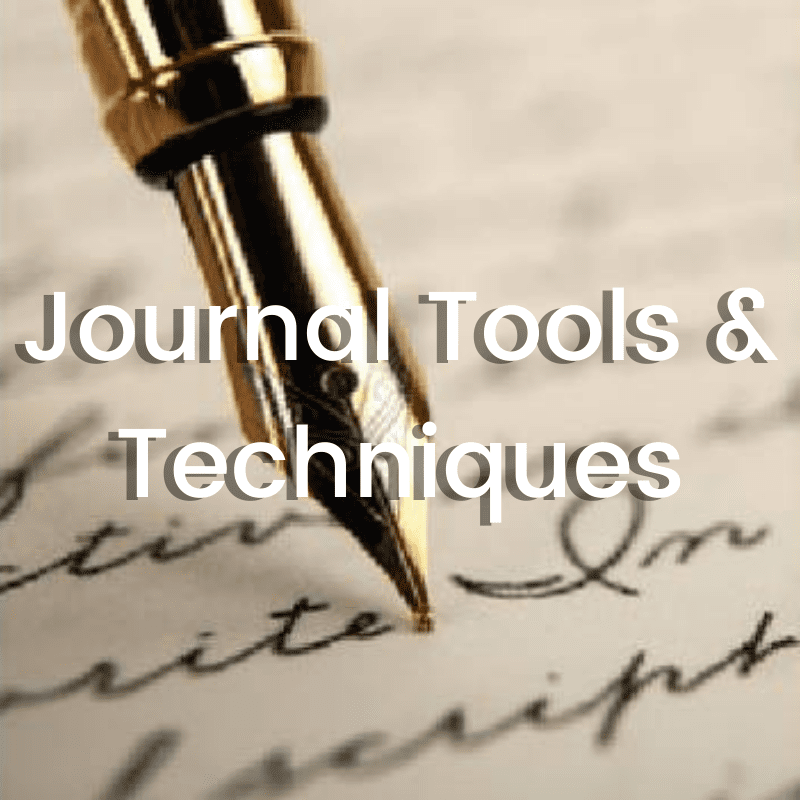

Create Your Environment
Being intentional about both our “inner” and “outer” conditions can enhance the quality and enjoyment of the journaling experience.
Create Your Environment
Being intentional about both our “inner” and “outer” conditions can enhance the quality and enjoyment of the journaling experience.
- “Outer” environment: Ideally, creating your outer environment is all about finding a quiet, comfy, and restful spot or personal sanctuary (BTW being able to be outdoors can be a bonus) where you can settle in without distractions and be fully present to the experience. If there is no special place available, we have beautiful photos of natural environments that you can click on and “Choose where you want to journal today.”
- “Inner” environment. We also have an inner environment – our minds! While the process of journal writing can help clear our head, a simple centering practice before starting to write can reduce the “busyness” of our surface-level thoughts (you know, like to-do lists or the irritations of the day!) To assist you, there will be mindfulness activities on the site so you can reference things like focused breathing, reading a poem, listening to music, or other opportunities to set the right tone.
- Or, forget the environment! Sometimes, when ideas start to rumble around in your head, what is most important is just plopping down anywhere, grabbing your journal while in a frenzy of emotions and inner turmoil and capturing THAT experience on the page. Journaling often is just the thing that can create clarity in our over-active, under-focused brains. When inspiration hits, don’t lose those personal AHAs! or new insights or compelling questions that are popping up and demanding attention.
Optimize Your Experience
While there’s no one “right” way to journal there are some basic principles that can impact the effectiveness of your journaling practice.
Optimize Your Experience
While there’s no one “right” way to journal there are some basic principles that can impact the effectiveness of your journaling practice. Read More
Do a quick self-assessment of your journaling “readiness” by checking in with yourself on these considerations:
- Your willingness to be completely honest with yourself.
- Your commitment to set aside time for this reflective process to blossom.
- Your decision to not be a tough critic, to let go of unreasonable standards and expectations concerning both your ability to write and the worthiness or validity of what you have to say.
- Your willingness to not edit or censor your thoughts as they arise.
- Your openness and curiosity in allowing yourself to be surprised. Write to discover rather than to report.
- Your thoughtful strategies to keep it safe so that you can write freely and be completely honest. You will need to find your way(s) to keep your journal safe from the eyes of others.
The bottom line is that the only “failed” journaling effort is the one you didn’t make. Simply having the intention and getting even just a few words scribbled down deserves a thumbs up. There are no “rules” except showing up, journal in hand, and getting something written.
Reflect with Others
While journaling is, above all, a solitary introspective practice for self-discovery, it’s important to have trusted partners to reflect with as you gain insights.
Reflect with Others
While journaling is, above all, a solitary introspective practice for self-discovery, it’s important to have trusted partners to reflect with as you gain insights.
Ultimately, it’s important to process and then use discoveries as a way of moving forward, creating the life you want for yourself. One of the best ways to do that is to choose people with whom you can share your thoughts and bounce ideas around.
When engaging others for support, here are three things to consider:
- Oftentimes, those next formulative plans are best explored in the company of others – whether just one trusted friend who serves as a sounding board or a supportive community that is willing to share ideas and insights about what now and what next.
- Also, sometimes journaling brings up difficult emotions, memories, and unresolved issues. It can be helpful to have at least one trusted partner/loved one/friend with whom to share these challenging insights and the questions that arise in their wake.
- And, sometimes, we need additional more focused (and/or less intimately involved) support. This person can be a professional counselor or a coach, a trusted teacher or minister. Actually, coaches and counselors often encourage journaling as a way to reveal and explore difficult issues and discover new possibilities for resolution in the process.
How to choose this person or community? Look for those who know how to practice active listening - empathetically, with curiosity and without judgment. Beware of those who feel the need to engage in a running commentary or give unsolicited advice.
Leverage our Resources
Remember that Purpose Journal is here to help. We have tools available to enhance both your inner and outer environments.
Leverage our Resources
Remember that Purpose Journal is here to help. We have tools available to enhance both your inner and outer environments through the use of techniques like focused breathing, meditation, ritual, poetry, and music. We create opportunities for facilitated community circle conversations. We offer insights and workshops about how to practice and ask for deep listening, as well as all kinds of personal growth and life-enhancing topics. And we have ICF (International Coaching Federation) certified coaches on staff available to work with you as you gain more clarity about the shifts you are ready to make in yourself, your relationships and your life.
We’ve just launched this community in Fall 2020, so we continually adding new tools, resources, events and offerings - and inspirational new journals, too! Please reach out to us with your ideas, needs and experiences by completing the contact form on our Connect page.

Allow a free flow of thoughts, uncensored. Try to write continuously without lifting your pen for a deep experience of this liberating sensation. You can either just sit down and start or you might give yourself one simple framing idea to focus on. Such questions might be “What am I feeling right now?” or “What is alive in me right now?” This is an easy technique that can yield interesting and surprising insights.
Create a written dialogue with someone else about something specific, something about which you might want some clarity. This is particularly helpful when preparing for a difficult or sensitive conversation or if you just need to work out thoughts or feelings about someone you’re in relationship with. This can be done in several ways: 1) how you imagine another might answer, 2) how you wish they would answer, focusing on your own needs for connection and understanding, or 3) you might find yourself more concerned with your opportunity to clearly say what it is you want to express.
Create a written dialogue with yourself: between/amongst various aspects of self. This can be in the form of questions and answers such as “How have I been touched by this experience?”, “What do I now know, feel, understand?” or “What is the deeper significance of what I have experienced?” Journal on only the left half of the page and use the righthand side of page to insert your thoughts and comments.
Here a few good ways to begin to create a daily journaling practice that becomes a healthy and helpful habit:
- A blessing a day. Select one thing you've noticed today that you are willing to accept as a special gift from the day. End with a thank you.
- The best and/or most meaningful thing(s) that happened to you today.
- Journal about specific events, issues, problems, joys, blessings, concepts, ideas, quotes, people, fears, etc. Title the entry.
To feel more connected (or when you cannot connect) to someone else, write your thoughts in the form of a letter. You might choose to send the letter…or not. This is a particularly helpful gratitude or forgiveness practice. You can even write letters to people are have passed away, as a way of expressing things that perhaps were left unsaid. The possibilities are endless and can be healing and cathartic.
You can use a journal to write your autobiography in detail or just by reflecting on significant life-changing events. Some ideas to get you started: capture and explore a specific holy moment in your life or think about a particular time in your life that was transformational…and why.
Our dreams are other ways of knowing and tuning into a deeper awareness. Be sure to keep your journal by your bedside so you can catch your dreams as you awaken before they disappear into the morning ethers. Dreams sometimes feel random and at other times feel meaningful, as if they hold messages for us. They often do. Keeping a journal of our dreams can help us identify patterns in our subconscious that might hold important insights. Or, they might just be fun stories to recall and share.
List making might seem like “journaling light.” However, it actually can be a very powerful practice to direct focused attention to something that’s important to us. The process of developing a list forces us to think more deeply and expansively about whatever it is that’s on our hearts and minds. Here are some list-making thought starters:
- 25 things you like/appreciate about yourself
- 25 things you like/appreciate about another
- 25 ways you want to make a difference in the world
- 25 ways you can help to fight intolerance
- 25 things you want to do before you turn 25 or 50 or 75.
- 25 things for which you are grateful
- The Bucket List
- Make up your own lists!




